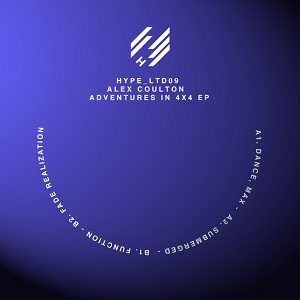Alex Coulton Adventures in 4×4
Mancunian wunderkind Alex Coulton has amassed a formidable discography while still in his teens. His […]

Mancunian wunderkind Alex Coulton has amassed a formidable discography while still in his teens. His crisp, subby palette draws to mind UK funky and assorted tech-house, but is generally thrown way out of normality by his proclivity for breaking up tracks with disjointed swings. If there’s a closer analog, it’s his brother Jack’s project Szare (in spite of the group’s communist, fourth-world bent), as that outfit operates with a similar, grimly rolling charge. Although Coulton is adored by a host of adventurous heads, there is an underlying functionality to his work, and this is more evident than ever on Adventures in 4×4, his debut for Hypercolour’s HypeLTD sub-label. As its title suggests, it’s a sort of limited exploration.
It’s unclear whether Coulton actually sought to limit himself here, but the remarkable coiled ferocity of earlier tracks like “Baraki” or last year’s “Bounce” is nowhere to be found. The tracks on Adventures in 4×4 find him playing to a different audience altogether. “Dance, Max” is relatively traditionalist, as its stabbed-out organ melody is redolent of so much ’90s house. Modern touches still remain in the melody’s eventual pitch twisting and the overall sense of space, but it generally sounds like the work of someone else. Coulton’s signature swing emerges more forcefully on “Submerged,” though it’s weighted down by the track’s echo-chamber chords, and never really comes to the fore. “Function” shows a similar compromise. Its stiffly frantic skip and stabbed out melody are efficient, if a little unremarkable, but the bulbous bass hits that sporadically poke out give it a lift. The EP’s finale, “Fade Realization,” is the best piece here, showcasing the bare percussiveness that has endeared Coulton to the Bristol scene. Sounding like Peverelist, or perhaps A Made Up Sound, “Fade Realization” hones in on a sparsely stepping rhythm, which is cut with reverses and bass drops. It’s buffered with rubbery, dubby chords that alternate between clipped hesitance and full drone, as well as a smattering of woozier, higher notes. The track is almost imposingly angular at first, but one pictures it working wonders as a fissure in a mix. On the whole, though, Coulton’s retreat toward more tested motifs is not especially promising. One hopes he won’t abandon his roots altogether.

